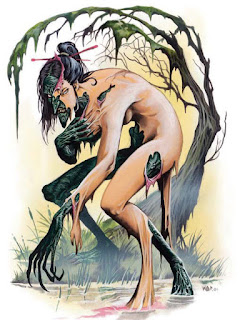You see, he already had a firm grasp on the careers system. Take Oliver Twist, for example; his career path would be something like: orphan–>laborer–>mourner–>street thief–>gentleman
Dickens was also no stranger to the "gribblies"; his stories feature spontaneous human combustion (chaos at work), gangs of child thieves (chaos cult, Fagin is turning those children into skaven), misshapen and uncanny young girls (Jenny Wren is a daemone‚ss of Slaanesh), a guy whose job is to fish corpses from the river (Gaffer Hexam–tell me that isn’t a Warhammer name!), and a passel of ghosts, ever-hungry Fat Boys, etc.
Of course, Dickens would also be quite generous as a GM. No matt‚er how lowly you started in his game, Wealthy Bourgeoisie would always be a career exit. And he’d hand out a ton of Fate points.













































